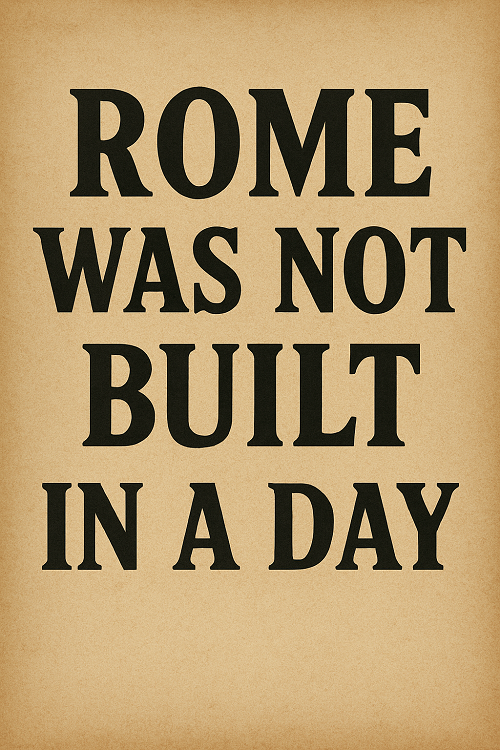Nothing great or valuable is possible in this world within a short
space of time. All such things must be accomplished gradually. No one
can reach the summit of a mountain by a single leap. The climbing must
be done slowly and cautiously and considerable effort is required to reach
the top. A building cannot rise suddenly from its foundation to roof. It
must be constructed step by step: first the foundation, then the plinth, then
the walls and finally the roof. The city of Rome with its magnificent
buildings, public parks and squares and its extensive empire, embracing
almost the whole world, was not the world of a single day. Rome was at
first only a small village having only a few mean huts. Long years of
patient toil on the part of the people, their perseverance and strong
determination made Rome the greatest power in the world and helped her
batain the height of glory and prosperity. It was not the work of days or
months but years.
That is true of everything great in this world. One cannot expect
e successful in any great undertaking in the course of a few days. In
to be order to accomplish any difficult task certain qualities are essential. In the
first place, a clear-cut plan arrived at after due and mature deliberation is
necessary. Secondly, there must be an earnestness about the world
undertaken, and lastly, patient perseverance is needed to carry the work
through. Over and above these essential qualities, time and steady
application and industry are also indispensable. Armed with these
qualities, any man can hope to achieve success in any enterprise, however
great and difficult it might be.
Without the qualities mentioned above, however, it is not possible
to accomplish any great object or to come out successful in any difficult
undertaking. If a person sets about anything without a definite and
carefully considered plan, ten to one he will have to turn back after having
proceeded a little way and so much labour and time will be wasted. He
will meet with difficulties which he never contemplated and he will have
no other alternative but to begin afresh. Haste and impatience also stand in
the way of success. These two things make diligence, perseverance and
close attention impossible and, without these, there can be no hope of
success. Moreover, one who does not possess patience is not capable of
sustained effort and very soon, long before half the world is completed,
one’s effort begin to lose their intensity and one gives up the talks in
disgust. Want of perseverance is another obstacle in the path of success. In
every great undertaking one is sure to meet with failures, for the path of
success is not strewn with roses. One should not lose heart at these
failures, but proceed in one’s work steadily and perseveringly. But one
who is not endowed with this quality of perseverance will receive a
setback as soon as failures overtake. One will lose all energy and give up
one’s task in despair.
The truth of the proverb “Rome was not built in a day” is amply
illustrated in the history of the English people. Their early accounts show
that they were a race of rude savages. By dint of patience and
perseverance, they slowly acquired civilisation and began to extend their
possessions bit by bit. They came to India as petty traders and by virtue of
their qualities, gradually established their sway over the whole of such a
large country as India. In the same slow manner their dominions extended
till at last at the present day we find that the “sun never sets on the British
Empire” so extensive are her possessions. This achievement of the
English people was not the work of a day, but of a thousand years, and
was only possible because they were a diligent and a persevering race. Chinese philosopher, Foo-tsze who had given up his literary pursuits
small bar of iron on a piece of stone with the object of making a knitting
needle out of it. The lesson taught by the woman was deeply impressed
him and by virtue of his patience he rose to be one of the greatest
was inspired with patience on seeing a woman rubbing a
The proverb “Rome was not built in a day” teaches us that it is
foolish to expect to achieve anything great in a single day. We must allow
time for the accomplishment of a great object and must have patience and
perseverance to see it through. The proverb is an eye-opener and a source
of encouragement to us. If for the building of the vast Roman Empire it
was necessary to spend vast energy and enormous time, then it is no
wonder that proportionate energy and time will have to be spent for all
great things. The example of Rome should fill us with vigour and energy
even though
we meet with failures, and should take us onward till we
succeed in achieving the great object which is our goal.
